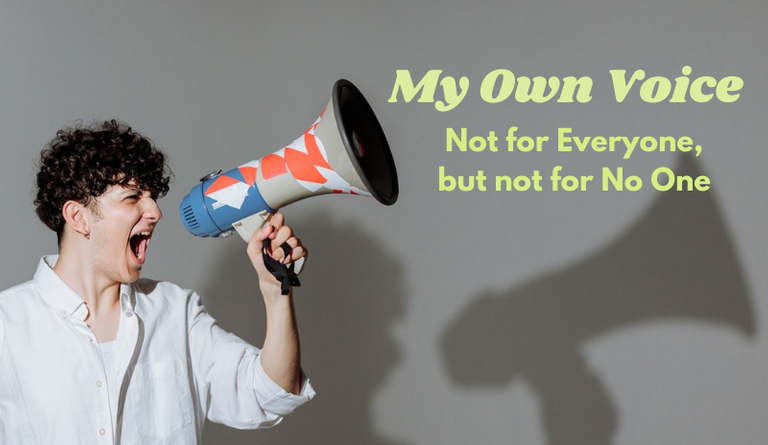
My Own Voice. Basic Photo by Thirdman
Overcritical of My Writing
When I started taking poetry a bit more seriously, I first struggled with how my writing should look like. By default, I was looking at others' work and comparing. My poetry felt very different, which I attributed to being inferior; which I no longer thing is the case. In my mind, there was an objective good, and I tried to apply that to something like writing, which in most of its essence, is subjective.
Although one may take inspiration from others to grow their art, what I ended up doing was taking out my voice. The question was no longer what do I want to say? but it became what do others want to hear? This question, at times, can be a useful critique while editing some works one may want to publish, but it was more harmful while writing, including the drafting stage. And it was basically impractical for me to think that way -- writing is an activity I engage in for the sake of it, rather as a career or financial opportunity. So, how can I go about discovering my own voice?
Masking for Others
Perhaps before identifying the solution, one has to discover the root of the problem. In my case, I believe that a significant contribution of the problem lies in masking. Masking is a behaviour that a lot of us neurodivergent folk engage in to mask what we truly feel and instead portray it as something digestible to those around us. It is demanding and exhausting, but we have learned ways how to fit in because we are singled out and rejected for who we are.

Masking. Photo by Magda Ehlers
Ever since I was a child, I had learned to mould myself to what others expected of me. My learnt way of communication was primarily focused on what others deemed acceptable; thus, it is not incomprehensible that this translates to my writing.
Combined with the abundance of content, I fell into the trap of not listening to myself but trying to assimilate once again. To not be left out. To be one of the rest. Unfortunately, that is an unhappy state to be in for a while, I lost connection with my writing, even if I thought I should be proud of what I am writing.
Rediscovering my Own Voice
Taking a hiatus from publishing anything was very fruitful; in the instances where I wanted to write, I started writing for myself again. And I got to re-read some of my past work, and I fell in love again with writing as I saw my voice emerge once more in an ocean of words. In truth, I know that my first works are not masterpieces poetically, but emotionally they are raw and they are meaningful. So why should I feel negatively because they may not match up to the best writers out there? Why did I have to feel the need to move on from them and try to fit in?
In the past two years, I have focused mostly on writing and drafting pieces, rarely focusing on polishing a piece to perfection. I haven't been at the state of wanting to consume my energy into refining something for the eyes of others. There's a flaw in how I used to do that, and I need to find a new way. But in the meantime, I have rediscovered a way to express myself once more. I have become in tune with what my heart wants me to say, even if nobody else will listen.
Making Myself Heard
No voice is meant for everyone. In a world of billions of people, I cannot expect to be heard by masses, and that's okay. Perhaps sometimes that is the battle with arts; we put so much time and effort into our works for them to be consumed so lightly by others that it almost feels meaningless. And perhaps I have come to terms with the fact that sometimes, my work is just going to be glanced over and that is it.

Getting Back to Writing. Photo by Min An
However, that is not an excuse to keep everything to myself. As I learnt from my recent Transformative experience of an Open Mic, there comes power in sharing. And under the right circumstances, if I am heard, I am also likely to be listened to. In reality, I have to let others decide if they want to listen - if they do and they love what I wrote, or if they were impacted, yes, that would bring me more satisfaction. If it doesn't, that's okay too. Running from rejection is not a good way to live.
I Belong Here, and so do You
The most painful thing we could do is to shut ourselves up. It can be draining and isolating to put your voice out there, only for it to dissipate in thin air as if you never were there. Yet, it is more destructive to not be heard because you do not try. It feels worse; despite being in control of not being heard, it does not kill away any insecurities.
I notice several parallels with my PTSD and the fact that trauma changed how I communicate and behave. It's been a long journey in which I struggled to find my voice back. The scariest experiences were, that post-trauma, I shell myself -- being in situations in which my mind has numerous thoughts but my body does not even attempt to communicate them, neither verbally nor non-verbally. You know the cliché that words are stuck in your throat? It wasn't like that. It was more of a void where words were not even being created internally.
I don't wanna ever fall back into that same mindset. I have been making an effort to make myself heard in many ways: this post; sharing my poetry; gaming livestreams and videos. And I wanna explore more avenues to mark my presence. At this point, I no longer not care if there is anyone out there that gets me. I deserve this space. I will own this space. I belong in this space. I belong in this world, and I will not be intimidated out of it.
Links
- Download free copy of my chapbook: From the Backseat of a Bus
- Official Publications: Poetry by Jeremy
- Ko-Fi: PoetryByJeremy
- Twitter: @PoetryByJeremy